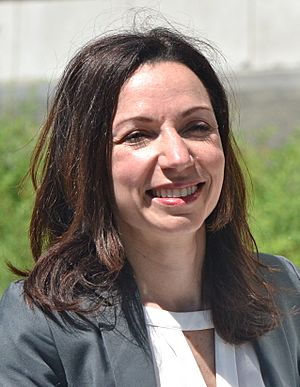Martine Ouellet facts for kids
Quick facts for kids
Martine Ouellet
|
|
|---|---|

Ouellet in 2016
|
|
| Leader of Climat Québec | |
| Assumed office May 14, 2021 |
|
| Preceded by | Position established |
| Leader of the Bloc Québécois | |
| In office March 14, 2017 – June 11, 2018 |
|
| President | Mario Beaulieu |
| Preceded by | Rhéal Fortin (interim) |
| Succeeded by | Mario Beaulieu (interim) |
| Member of the National Assembly of Quebec for Vachon | |
| In office July 5, 2010 – October 1, 2018 |
|
| Preceded by | Camil Bouchard |
| Succeeded by | Ian Lafrenière |
| Personal details | |
| Born | April 8, 1969 Longueuil, Quebec, Canada |
| Political party |
|
| Other political affiliations |
|
| Alma mater | HEC Montreal McGill University |
| Profession |
|
Martine Ouellet (born April 8, 1969) is a Canadian politician. She was the leader of the Bloc Québécois from 2017 to 2018. She also served as the Minister of Natural Resources in the Quebec government from 2012 to 2014.
Ouellet was first chosen to represent the area of Vachon in the National Assembly of Quebec. This happened in a special election on July 5, 2010. She ran as a candidate for the Parti Québécois.
On May 14, 2021, Ouellet announced she was returning to politics. She started a new provincial political party called Climat Québec.
Contents
Early Life and Education
Martine Ouellet grew up in the South Shore region of Quebec. She studied mechanical engineering at McGill University and finished her degree in 1992. Later, she earned a Master of Business Administration (M.B.A.) from HEC Montreal. Before she became a politician, Ouellet worked as an engineer for Hydro-Québec, a large electricity company.
Her Political Journey
Starting in Quebec Politics
Martine Ouellet was elected to the National Assembly of Quebec on July 5, 2010. This was during a by-election, which is a special election held to fill a vacant seat. She represented the area of Vachon as a candidate for the Parti Québécois.
After the Parti Québécois won the election in 2012, she became the Minister of Natural Resources. She held this important job until her party lost the election in 2014. Ouellet also tried to become the leader of the Parti Québécois in 2015 and 2016. She finished third both times.
Leading the Bloc Québécois
On February 5, 2017, Ouellet announced she wanted to become the leader of the Bloc Québécois. This is a federal political party in Canada. At the same time, she left the Parti Québécois and became an independent member in the Quebec National Assembly. She said she wanted to be involved in both Quebec City and Ottawa. Since she was the only person running for leader, she officially became the leader on March 18, 2017.
In June 2017, some members of her team, called the caucus, had disagreements with her. This happened after her chief of staff shared information with the media. Ouellet solved the problem by letting her chief of staff go and saying sorry.
Later, on February 26, 2018, another member of the Bloc, Gabriel Ste-Marie, stepped down from his role. He had disagreements with Ouellet's leadership style. Seven out of the ten Bloc members in Parliament showed they were against Ouellet's leadership. They said she was too bossy.
Ouellet had given a speech where she felt there was resistance to her leadership. She also believed the Bloc should focus more on Quebec becoming independent. Some members disagreed with her speech.
The party decided to pay Ouellet a salary because she did not have a seat in the federal Parliament.
On February 28, 2018, the disagreements reached a point where seven members left the Bloc Québécois team. They became independent members of Parliament. They said Ouellet's leadership style was the reason. This left the Bloc with only three members. Many former Bloc members, including a past leader, asked Ouellet to resign. However, the party's executive committee supported Ouellet. The seven members who left later decided to form a new political group called Québec debout.
On June 3, 2018, the party held a vote to see if members still supported Ouellet as leader. Only 32% voted to keep her, while 67% voted against her. After the results, Ouellet said she was resigning as party leader on June 11, 2018. By September 17, 2018, all seven members of Québec debout had rejoined the Bloc Québécois.
Back to Provincial Politics
On May 14, 2021, Martine Ouellet announced her return to politics. She started a new provincial party called Climat Québec. She ran as a candidate in a special election in the 2023 Jean-Talon provincial by-election but finished in sixth place.
 | Aaron Henry |
 | T. R. M. Howard |
 | Jesse Jackson |

